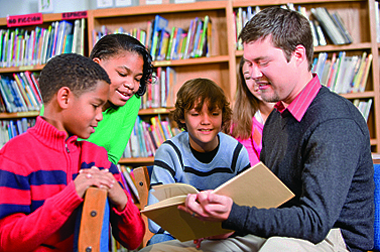UAlbany Researchers Examine the 'School Librarian Effect'
 |
|
Researchers at UAlbany are conducting a study of how student learning and school librarianship are interconnected, and how librarians can better serve to advance student achievement.
|
ALBANY, N.Y. (July 14, 2015) -- Researchers at the University at Albany's College of Engineering and Applied Sciences (CEAS) have received $477,997 from the Institute of Museum and Library Services (IMLS) to examine the role of school librarians (SLs) in supporting and advancing K-12 education in New York State.
Joette Stefl Mabry, Associate Professor with the Department of Information Studies at CEAS, and Michael Radlick, CEO of Learning Technology Visions, LLC, will collaborate with the New York State Education Department (NYSED) on a three-year study of how student learning and school librarianship are interconnected, and how librarians can better serve to advance student achievement.
According to the American Association of School Librarians (AASL), school librarians, as part of a school team consisting of administrators, teachers, parents, and students, have a critical role to play in the successful implementation of the new Common Core State Standards (CCSS). School librarians are uniquely positioned to influence and implement many of the school-wide goals and initiatives to ensure that all students are college and career ready because they work across grade levels and across disciplines.
 |
|
Information Studies Associate Professor Joette Stefl-Mabry (Photo Mark Schmidt)
|
Their pilot, a longitudinal between-schools design, studied New York State’s 2,245 public schools outside of New York City with students in grades 3 through 8. Utilizing NYSED's annual state assessments in math and English Language Arts (ELA), the study examined the role of SLs in student performance, while controlling for a wide range of demographic and school characteristics. Based on the results from the structural equation models, librarians were shown to have a statistically significant impact on student achievement in ELA scores.
The IMLS research grant will allow Stefl-Mabry and Radlick to expand their pilot to model New York City’s program, as well as across other school years and other school levels. The goal is to develop robust models to investigate other school library factors and resources that are most strongly related to this effect on student achievement.
"Professional, certified school librarians are educators and information specialists who influence students’ mastery of a wide range of cognitive interpersonal and intrapersonal skills and competencies," said Stefl-Mabry. "Identifying the elements and variables that influence school librarians' effectiveness on student learning will be of benefit to all educators, including those in K-12 through higher education. Such characteristics, if demonstrated to positively effect student learning, could then be integrated into K-12 and higher education instructional practices, as well as in school library and teacher preparation programs and curriculum."
The University at Albany's College of Engineering and Applied Sciences (CEAS), formerly the College of Computing and Information (CCI), is home to UAlbany's Departments of Computer Science, Informatics, Information Studies, and Computer Engineering. As UAlbany seeks to expand its academic footprint, new multidisciplinary programs that build on the innovation established by CCI and its predecessors will allow the University to create novel paths of excellence in information, computing and, engineering studies and to better educate students to meet the demands of today's society.
![]() For more news, subscribe to UAlbany's RSS headline feeds
For more news, subscribe to UAlbany's RSS headline feeds
A comprehensive public research university, the University at Albany-SUNY offers more than 120 undergraduate majors and minors and 125 master's, doctoral and graduate certificate programs. UAlbany is a leader among all New York State colleges and universities in such diverse fields as atmospheric and environmental sciences, business, education, public health,health sciences, criminal justice, emergency preparedness, engineering and applied sciences, informatics, public administration, social welfare and sociology, taught by an extensive roster of faculty experts. It also offers expanded academic and research opportunities for students through an affiliation with Albany Law School. With a curriculum enhanced by 600 study-abroad opportunities, UAlbany launches great careers.


